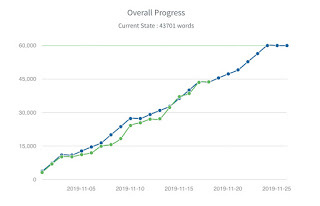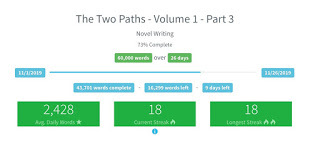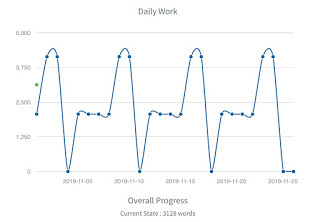Michael Gouker's Blog, page 2
June 29, 2020
“By the Strength of Their Illusion”: Reflections on the Scottish Play
 Macbeth by William Shakespeare
Macbeth by William ShakespeareMy rating: 5 of 5 stars
Although the signifier “mirror” is absent from Macbeth, and “glass” only appears twice, once as a prop instruction and once in dialogue, The Scottish Play fairly bristles with reflections, though like the mirrors of its time, they are somewhat deceptive. First, of course, is the mirror in the apparition shown by the three witches to the haunted king. Macbeth’s vision of Banquo’s kingly successors, especially “the eighth [who] appears, …bear[ing] a glass… show[ing]… many more” dooms his erstwhile ally (Mac. 4.1.118). The doctor and gentleman who watch Lady Macbeth sleepwalking in Act V, Scene I, are another mirror, this time reflecting the play’s audience. Finally, there are the transgressive mirrors addressed by Garber, those “taboo border crossings” (91) “between a thing and its reflection,” (93) such as “sleep/waking, male/female, life/death, fair/foul, heaven/hell, night/morning,” which pervade Macbeth, seasoning it with Umheimlich (91). All of these mirrors collaborate to resolve a key point into focus, one apt for the play’s time: Regicide leads only to senseless bloody chaos, and the guarantor of a healthy, stable nation is a virile king.
Arguably, the play’s protagonist Macbeth is a similarly twisted reflection of King James I. While both men have Scottish roots, Macbeth came to his throne on the wings of war with Ireland and Norway, “Pale Hecate's offerings[,] and wither'd murder” (Mac. 2.1.52). In contrast, King James I ascended to rule peacefully as the first cousin twice removed of Queen Elizabeth I. No lover of war, one of his first foreign policy gambits was to negotiate the Treaty of London ending a 19-year conflict with Spain. He even managed to steer England clear from most of the disastrous Thirty Years War. The play’s reference to Hecate, goddess of witches, and Macbeth’s interactions with the witches also relates inversely to King James I, who, while best known for the 1611 translation of the Bible, also wrote Daemonologie, a dialogue where two men, Epistemon and Philomathes, discuss topics like Satan, witchcraft, necromancy, spells, and, naturally, demons, all with an air of casual, pious misogyny. In fact, Garber asserts that Shakespeare may have included the three witches and Hecate in the play because of the king’s “interest in witchcraft” (116). The apparition with the glass and line of Banquo’s successors would have also pleased King James I, because he “traced his ancestry to Banquo” (Garber 116).
Virility is another distinction where King James I has an apparent advantage. Barmazel relates Macbeth’s political ambitions to his member, asserting both are “insufficient to the task at hand,” the two tasks being murder and procreation of a political heir (123). Macbeth’s lack of issue is notable, especially when compared to Duncan (who has two sons, Malcolm and Donalbain), Banquo (whose son Fleance escapes Macbeth’s assassination scheme), and Macduff (whose child is slaughtered by one of Macbeth’s “shag-haar'd villain[s]”) (Mac. 4.2.78). Barmazel notes that because Lady Macbeth is intimate with nursing, “the responsibility for any reproductive problems the couple might have lies squarely with Macbeth” (121). Nor is fictional Macbeth’s case helped by Lady Macbeth’s constant chiding of his manliness, saying, “When you durst do it [murder], then you were a man” (1.7.49). Moreover, her erotically-charged soliloquy in Act I, Scene V, beseeching spirits to “unsex me here;/and fill me, from the crown to the toe, top-full” speaks volumes about her femininity, for she must be sexual to require such unsexing. On the other hand, she exhibits a number of frightening characteristics for a woman in those times; for example, her first appearance— “Enter Lady Macbeth, reading a letter”—would have raised Daemonologie’s witch-hunter eyes (Mac. 1.5.1). Also, in Macbeth’s defense, the prevalence of child mortality fully explains the lack of an heir, a point Barmazel admits but stresses somewhat less than her allusions to his lack of a “‘rat without a tail’…’prick’ to use with his wife” (123). Indeed, of the seven children of King James I, only three reached adulthood, and he lived six centuries after the real-life Macbeth ruled Scotland .
Overall, the evidence of Barmazel along with the writings and actions of King James I show that the tragedy of Macbeth itself is a Garber transgressive mirror that successfully counterposes the images of the two kings, making the advantages of Shakespeare’s patron readily apparent. Shakespeare also had a noble goal. Macbeth’s theme of chaos and regicide were especially relevant in the context of early attempts to overthrow his rule, such as the Gunpowder Plot of the 5th of November 1605, when Jesuits attempted to assassinate the king, blow up Parliament, and install his oldest daughter, Elizabeth Stuart, to the throne. This followed on the heels of an attempt to remove King James I shortly after his coronation, the Bye Plot, another effort to restore England to Catholic rule. Indeed, regicide attempts were common in an era of religious conflict and political uncertainty. Macbeth not only depicted the danger of such anarchy and chaos, but also used the Lady Macbeth sleepwalker scene to allow the audience to contemplate themselves in the throes of such chaos, driving home the message. Altogether, the piece served as an effective means of using art to influence King James I’s subjects and move them away from contemplating alternatives on the other side of the glass.
Works Cited
Barmazel, Julie. “‘The Servant to Defect’: Macbeth, Impotence, and the Body Politic.” Macbeth: New Critical Essays, edited by Nicholas Rand Moschovakis. Routledge, 2008, pp 118-131.
Garber, Marjorie. “Macbeth: The Male Medusa.” Shakespeare’s Ghost Writers: Literature as Uncanny Causality. Routledge. 1988. pp 87-123.
Shakespeare, William. “Macbeth.” The Norton Shakespeare: The Essential Plays/Sonnets, edited by Stephen Greenblatt et al. 3rd Edition. W.W. Norton & Company. 2016
View all my reviews
Published on June 29, 2020 14:25
June 23, 2020
A Book About John Bolton's Dereliction of Duty.
 The Room Where It Happened: A White House Memoir by John R. Bolton
The Room Where It Happened: A White House Memoir by John R. BoltonMy rating: 2 of 5 stars
It is truly appalling that someone who purports to be a public servant would maintain silence in the face of so much corruption going on in the same room, however this review is not about John Bolton, but this book he has written. Bolton's perspective comes with the assumption he is the smartest person in the room. Everyone else is a dummy, inexperienced, or otherwise lacking the ability to perceive the nature of evil in the world. That may be what he is going for, but he just comes off as a monstrous, spiteful, warmongering chickenhawk. All of his choices rely on using sticks, and he has no flexibility at all. Therefore, as a diplomat, he is a useless ass, but there is such a lack of self-awareness that you watch him patting himself on the back with "clever" tactics to avoid responsibility and accountability, dodging here and there, always aiming higher, always just a little bit short, mostly because he is entirely untrustworthy and vile, though he trumpets himself a patriot. Along the way, he takes down a whole group of diplomats who are catty to a fault. In the end I really wonder what any of them are doing in government.
That being said, some come off better than others, but the fact we perceive them through the distorted Bolton lens (where his own image is so blurred) lends them no credence. He did keep good notes, however, which would be terrible news for Trump's team, except the book is also such an overwhelming self-indictment of Bolton and his terrible judgment. Do his opinions matter at all? I don't think so. Trump, fwiw, comes off as you likely expect: a man of no morality who is fixed primarily on the public's perception of himself, without genuine beliefs, malleable to a fault, hilariously disloyal, and astonishingly unintellectual.
I hate what this book says about America, but I cannot one-star the book, despite the narrator's self-absorption. I think it is important people read it, because clearly half of America's voters are brainless too. No matter how you feel about Trump (I abhor him), I strongly feel people like Bolton should never be in government. He is a dangerous man who happily has no power anymore and, I hate to admit it, Bolton being out of government is to Trump's credit. :-( That Trump also hired him (after such a long romance when his defects would be glaring) and thought Bolton's ideas worthy at all tells us much about how empty of brains is the room where it happened.
View all my reviews
Published on June 23, 2020 11:31
June 3, 2020
Finding Redemption in the Deep
 The Deep by Rivers Solomon
The Deep by Rivers SolomonMy rating: 4 of 5 stars
Trying to do this without spoiling it for you, so bear with me. I'm not going to reveal too much more than the synopsis.
First, I really liked the root concept of the story, the origins of the Wajinru, the merpeople. Solomon creates a compelling story of their parallel development with the "two-legs" (humans) and puts her main character Yetu in a predicament that defines whether her species will survive. The story raises many questions about the role of history in indigenous people, and even the survival of languages and artifacts when all the people are gone.
Second, I love the gender bending romance in the middle. It added a necessary stake after the story had stalled for reasons better left to Yetu to explain. I had difficulty connecting with Yetu, but she is, after all, an alien, because I am a Two-leg, so this is actually an example of good writing making me uncomfortable.
The only issue I had with the story is how it ended, which made the stakes raised beforehand, oddly unimportant, or rather, the stakes were lower than I expected. I still loved the story. It's an important story, especially for the hellish 2020 we are living. The prose is often beautiful, so it tickles the wordsmith in me, and, yeah, the worldbuilding is great. An alternative history of merpeople reminds me a lot of what Octavia Butler did for Vampires in Kindred. Nicely played. :-)
View all my reviews
Published on June 03, 2020 14:04
June 1, 2020
#BlackLivesMatter
Published on June 01, 2020 19:02
May 25, 2020
Ph'nglui mglw'nafh Cthulhu R'lyeh wgah'nagl fhtagn.
 The Call of Cthulhu by H.P. Lovecraft
The Call of Cthulhu by H.P. LovecraftMy rating: 5 of 5 stars
"That is not dead which can eternal lie,
And with strange aeons even death may die."
The Call of Cthulhu is a feast of creepiness told in colorful language, which is only flawed by Lovecraft's primitive obsession with physiognomy and base racism. I view it as funny, because they are (to quote HP himself) "obsolete and ridiculous," but I sympathize with people of color who read this and have to deal with dismissive references to such things as Negro fetishism. The story itself is almost without a plot, just a report of a horror of the odious being that the sailors rouse from its sleep. The prose is circuitous and leisurely, but Lovecraft's imagination is perturbing and vision resolves clear in the end, and it's scary. Really scary.
View all my reviews
Published on May 25, 2020 20:11
Pornland is Informative But Also As Boring As Porn
 Pornland: How Porn Has Hijacked Our Sexuality by Gail Dines
Pornland: How Porn Has Hijacked Our Sexuality by Gail DinesMy rating: 2 of 5 stars
Dines's book is an excursion into the destructive nature of pornography on our society. It hits some of the problem on the head, especially the violence of the gonzo olympics. However, the book is flawed in that Dines enters the discussion with a set of beliefs about what is normal/anormal, right/wrong, and acceptable/unacceptable. Sex is fuzzy and illogical, and there is no one qualified to set moral standards. Also, part of the problem is how society treats people that pass through the mill, and, honestly, this book doesn't help. I would prefer the judgmental aspects about which acts are barbaric or not to have been left out, because it gets preachy fast, and who am I (and who is Gail Dines?) to tell someone about their sexuality? When the book discusses the violence, the exploitation, and the capitalistic drive of the industry, it does a lot better.
I took a full star away, because after such long-winded ranting, Dines includes only a few pages of suggestions to solve the issue. Where is the enlightened lesson to share? Also, Dines regularly returns to the fact that boys will have porn as their first introduction to sex, equating it with violence and abuse of women, however, if our society were more forward-thinking, boys and girls could have an earlier sexual education that is healthy, one that includes education about the damage violence and degradation does, how women should be revered rather than reviled, etc. I am not arguing for pornography in primary school, but rather the inclusion of subtle positive messages about women (& indeed about gender acceptance, for ALL gender identities) in the curriculum. If positive messages are introduced earlier, maybe adolescents would reject violent imagery when they inevitably see it.
Personally, I'm not a fan of porn, because (sorry) it is SO boring. The $$$ involved show that this isn't a popular view, but I mine more erotism from words, especially when they explore terrain I am not likely to travel (The Well of Loneliness by Radclyffe Hall, Kushiel's Dart by Jacqueline Carey, and The Hunger by Whitney Strieber). Porn by contrast is quotidian. The best sex (for me at least) happens in the head, especially in the shared telepathy that coincides with raised collective consciousness.
Moreover, I don't think porn can be stamped out "War-on-Porn" like a cockroach. Cockroaches have been here millions of years. Porn has been with us a while now too. Maybe if more women were involved in the industry (small business loans and unionization), porn could become a way for creating a positive message for men & women to move past the gonzo olympic stage to some kind of mind meld where people really get closer. It reaches many people who have few other media inputs, so there is every chance it could become a tool in the right hands.
View all my reviews
Published on May 25, 2020 11:06
February 18, 2020
Leviathan Wakes (First story of The Expanse)
 Leviathan Wakes by James S.A. Corey
Leviathan Wakes by James S.A. CoreyMy rating: 5 of 5 stars
A good story set against a brilliant vision of the future solar system. I love the setting so much, especially all the political interplay. The characters were a bit of a reach for me at first, especially Miller's obsession with the dead girl. I get the career cop angle, the need to solve the case, but sometimes it got a little creepy, especially because Miller was so damaged.
By the middle of the story, after the arcs come together in a moment of delicious pov storytelling (master stroke!), the focus resolves better, and Miller ascends. Holden's crew is great too, and I like Fred & Julie too. Suddenly I'm really enjoying the story (with all the political machinations and interplanetary stratagems) because of the characters and their motivations.
The story takes off at this point, and you must grip tight. It's really impossible to put down, and I am so excited, because... there are so many more stories in the series. Struck gold again. :-)
View all my reviews
Published on February 18, 2020 20:08
November 1, 2019
NaNoWriMo - 2019 (updated 11/18/2019)
I started off well, finishing one of the sections of the 11th chapter (there are 4 sections altogether) and beginning the second. The rest of the weekend will be tough though, since most of my work is scheduled for weekends. I beat today's target by a thousand words but I must do more (4138 words each day) to be ready for next week. Another way to look at it is I have five chapters to write in four weeks. The first chapter (actually the 11th) should be done by Monday. Most of next week I'll work on Chapter 12 and start Chapter 13 on the weekend.
So, I'm on Chapter 14 now.



That's insane, right?
So, I'm on Chapter 14 now.



That's insane, right?
Published on November 01, 2019 20:44
NaNoWriMo - 2019 (progress report)
I started off well, finishing one of the sections of the 11th chapter (there are 4 sections altogether) and beginning the second. The rest of the weekend will be tough though, since most of my work is scheduled for weekends.
 I beat today's target by a thousand words but I must do more (4138 words each day) to be ready for next week. Another way to look at it is I have five chapters to write in four weeks. The first chapter (actually the 11th) should be done by Monday. Most of next week I'll work on Chapter 12 and start Chapter 13 on the weekend.
I beat today's target by a thousand words but I must do more (4138 words each day) to be ready for next week. Another way to look at it is I have five chapters to write in four weeks. The first chapter (actually the 11th) should be done by Monday. Most of next week I'll work on Chapter 12 and start Chapter 13 on the weekend.
 I beat today's target by a thousand words but I must do more (4138 words each day) to be ready for next week. Another way to look at it is I have five chapters to write in four weeks. The first chapter (actually the 11th) should be done by Monday. Most of next week I'll work on Chapter 12 and start Chapter 13 on the weekend.
I beat today's target by a thousand words but I must do more (4138 words each day) to be ready for next week. Another way to look at it is I have five chapters to write in four weeks. The first chapter (actually the 11th) should be done by Monday. Most of next week I'll work on Chapter 12 and start Chapter 13 on the weekend.
Published on November 01, 2019 20:44
October 26, 2019
My Favorite Story of 2019 (so far)
 Gods of Jade and Shadow by Silvia Moreno-Garcia
Gods of Jade and Shadow by Silvia Moreno-GarciaMy rating: 5 of 5 stars
Moreno-Garcia dipped into the inkwell of mortality to write a modern fairy tale about love, both romantic and fraternal, featuring Gods and a plucky character shaped by the world to be a reluctant hero. The world-building is brilliant, drawing from the lush background of Mayan cultural myths. Xibalba especially resolved itself in my mind's eye. Her characters reveal so many layers of complexity, especially Casiopea, she of the bad stars, a hero in every sense of the word.
Note: Some of the Mayan terms may be unfamiliar (like any fantasy story), but Moreno-Garcia actually provides a glossary at the end of the book. I found this out at the end of the book--LOL!--but it is helpful to know before.
View all my reviews
Published on October 26, 2019 09:57




